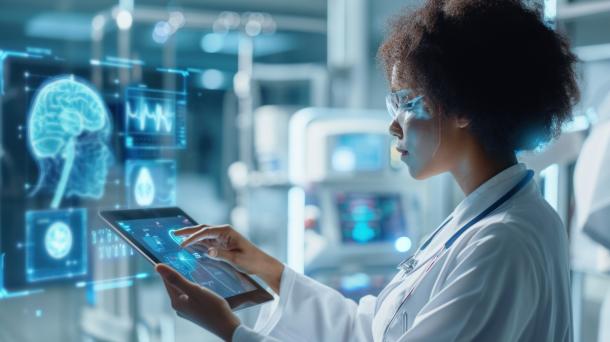News
AI-Powered Health: Bridging the Gap Between Technology and Wellbeing

This session explored how AI can enhance patient care, advance biomedical research, and ensure equitable access to healthcare innovations.
The webinar featured Almudena Bonet Medina from Telefonica Tech, Hannah Richardson from Microsoft Research, Eugenio Minvielle from INNIT, and Angel Melguizo from UNESCO, each providing valuable insights into the opportunities and challenges of integrating AI in healthcare.

Almudena Bonet Medina, representing Telefonica Tech, emphasized the importance of disease prevention and health promotion. Telefonica's approach focuses on three pillars: digital transformation, native digital solutions, and robust infrastructure and security. Bonet discussed the deployment of health data management platforms, or data lakes, which provide a comprehensive view of patient information accessible to various stakeholders. These platforms aim to enhance patient care and treatment by facilitating better data access and integration.
She also stressed the need for data governance and a digital transformation culture to ensure ethical and trustworthy AI applications. Telefonica's tools, such as the transparency score tool, support companies in enhancing their AI initiatives' transparency and ethical standards. she highlighted practical examples like the Genomcore Biomedical Information Management System (BIMS), which integrates and processes multimodal health data while ensuring user data remains secure. Another example was the ER dashboard, an AI-driven tool to support decision-making in emergency rooms by predicting patient inflow and resource needs. She underscored the importance of ethical and trustworthy AI, emphasizing Telefonica's transparency efforts to enhance the credibility of AI initiatives.
Hannah Richardson from Microsoft Research started by presenting a case study on using AI, specifically focusing on the project with Providence - a large hospital and health organization serving several western states in the US. This initiative aims to create computing models using clinical trial data and electronic health records to identify trends and reduce the administrative burden on medical professionals. The project employs a human-centered approach to consider impacts to both patients and clinical teams.
Richardson introduced Project MAIRA, a research project that aims to assist radiologists in delivering effective patient care. Richardson outlined five key practices essential for successful AI integration: multidisciplinary teams, responsible AI principles, data governance, a comprehensive data strategy, and practitioner engagement. She emphasized the need for diverse data sources and stakeholder engagement to ensure AI systems are fair, effective, and beneficial to healthcare providers. She discussed the potential for AI to better understand human biology and deliver better medicine. For this vision to succeed, this requires careful consideration for responsible use and the right applications of technology, and always with people in mind.
Eugenio Minvielle, Founder and President of INNIT, highlighted the significant economic burden of food-related health costs, which amount to $11 trillion and surpass expenditures on food, which stand at $9 trillion. He noted that this trend is projected to escalate to $47 trillion in food-related health costs by 2030. He posed the question of whether AI can help mitigate the impact of food-related diseases on health. Minvielle introduced INNIT's Food LM Platform, which leverages AI to empower consumers to make better, informed food choices. The platform focuses on providing precise recommendations, personalized information, and tools to have a positive health impact. He shared an example of a collaboration with Roche to support people with diabetes in making daily dietary decisions, showcasing AI's potential to address food-related health challenges.
Minvielle also highlighted a project with UNESCO to close the gender gap in cardiovascular disease (CVD) outcomes. About 25,000 women die each day of CVD (World Heart Federation), usually due to often silent symptoms that differ substantially from men’s symptoms. The project aims to have more data and develop AI tools that better recognize and address these disparities, ultimately reducing the high death rate from CVD in women.
Angel Melguizo from UNESCO emphasized the transformative role of AI in democratizing healthcare access and amplifying its reach, especially for underserved populations. He stressed the importance of ensuring that AI stays good by advocating for responsible AI development and implementation. However, today funds are directed mostly to tech development and less so to solutions. For instance, the market capitalization of the top 20 chip makers is equivalent to the total pharma sector (700+ companies, including J&J, Merck, Novartis, Pfizer), and NVIDIA capitalization exceeds that of 165 global healthcare companies (including Cigna, CVS, Walgreens).
Melguizo also highlighted the importance of neuroscience and neurotechnology as the next significant advancement in healthcare, driven by emerging technologies including AI. He noted that UNESCO is actively working on developing ethical recommendations for the use and development of neurotechnology, similar to their efforts with AI. UNESCO's frameworks aim to ensure the ethical deployment of these technologies, reinforcing their commitment to trustworthy and human centered technology.
Discussion on trust
The discussion focused on building trust in AI applications in healthcare. Panelists emphasized the importance of leadership in promoting the ethical use of AI. They agreed that trust is built by ensuring AI outputs are accurate, personalized, and useful, leading to positive impacts on individuals' lives, as demonstrated by INNIT.
The relevance of practical tools, such as ethical assessments, was highlighted. UNESCO's Ethical Impact Assessment, being implemented with private sector collaboration, served as an example. The panelists also underscored the importance of stakeholders engagement is crucial to understanding how they interact with AI systems and ensuring these systems meet their needs while making AI systems user-friendly, addressing potential risks, and maintaining a human-centered approach.
A cross-cutting theme was the critical role of data and data governance, which should follow security and fairness protocols.
In conclusion, the webinar highlighted the transformative potential of AI in healthcare, emphasizing responsible innovation, ethical considerations, and collaborative efforts. As AI continues to evolve, its integration into healthcare promises to revolutionize patient care, advance biomedical research, and promote health equity, particularly for vulnerable populations.









